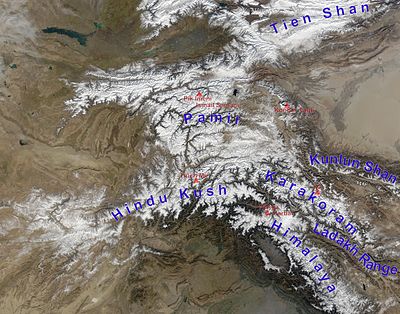Roof of the World

The Roof of the World or Top of the World is a metaphoric epithet or phrase used to describe the highest region in the world, also known as High Asia. The term usually refers to the mountainous interior of Asia, including the Pamirs, the Himalayas, the Tibetan Plateau, the Hindu Kush, the Tian Shan, the country of Nepal, and the Altai Mountains.
Attested usage
The British explorer John Wood, writing in 1838, described Bam-i-Duniah (Roof of the World) as a "native expression" (presumably Wakhi),[1] and it was generally used for the Pamirs in Victorian times: In 1876, another British traveler, Sir Thomas Edward Gordon, employed it as the title of a book[2] and wrote in Chapter IX:
- "We were now about to cross the famous 'Bam-i-Dunya', 'The Roof of the World' under which name the elevated region of the hitherto comparatively unknown Pamir tracts had long appeared in our maps.[...] Wood, in 1838, was the first European traveler of modern times to visit the Great Pamir,".[3]
Older encyclopedias also used "Roof of the World" to describe the Pamirs:
- Encyclopædia Britannica, 11th ed. (1911): "PAMIRS, a mountainous region of central Asia...the Bam-i-Dunya ('The Roof of the World')".[4]
- The Columbia Encyclopedia, 1942 edition: "the Pamirs (Persian = roof of the world)".[5]
- Hachette, 1890: "Le Toit du monde (Pamir)", French for "Roof of the World (Pamir)".[6]
- Der Große Brockhaus, Leipzig 1928–1935: "Dach der Welt, Bezeichnung für das Hochland von Pamir", i.e., "roof of the world, term describing the Pamir highlands",[7] and (in translation): "Pamir highlands, the nodal point of the mountain systems of Tien-Shan, Kun-lun, Karakoram, the Himalayas and Hindukush, and therefore called the roof of the world."[8]
With the awakening of public interest in Tibet, the Pamirs, "since 1875 ... probably the best explored region in High Asia",[4] went out of the limelight and the description "Roof of the World" has been increasingly applied to Tibet[9][10] and the Tibetan Plateau, and occasionally, especially in French ("Toit du monde"), even to Mount Everest,[11] but the traditional use is still alive.[12]


See also
References
- ^ Keay, John (1983) When Men and Mountains Meet ISBN 0-7126-0196-1; p. 153
- ^ Sir Thomas Edward Gordon, The Roof of the World: being a narrative of a journey over the high plateau of Tibet to the Russian frontier and the Oxus sources on Pamir, Edinburgh: Edmonston and Douglas, 1876
- ^ Gordon, p. 121f.
- ^ a b Holdich, Thomas Hungerford (1911). . In Chisholm, Hugh (ed.). Encyclopædia Britannica. Vol. 20 (11th ed.). Cambridge University Press. p. 655.
- ^ The Columbia Encyclopedia; 1942 edition, p. 1335
- ^ Guillaume Capus, Le Toit du Monde (Pamir), voyage extrême orient. Illustré de 31 Vignettes et d'une Carte, Paris: Hachette et Cie. 1890 = Bibliographia Marmotarum. Ramousse R., International Marmot Network, Lyon, 1997. ISBN 2-95099-0029 Guillaume Capus
- ^ Der Große Brockhaus in 20 vols, 15th ed., Leipzig 1928–35, vol. 4 (1929), p. 319
- ^ Der Große Brockhaus, vol. 14 (1933), p. 96
- ^ Le Sueur, Alec (2003-01-01). The Hotel on the Roof of the World: from Miss Tibet to Shangri-La. Oakland, Calif: RDR Books. ISBN 1571431012. OCLC 845721671.
- ^ "Tibet: Climate Action for the Roof of the World". Central Tibetan Administration. Retrieved 2017-04-17.
- ^ Encyclopédie et Dictionnaires Larousse.
- ^ The Pamirs, a region known to locals as Pomir – "the roof of the world".
